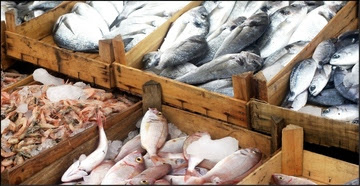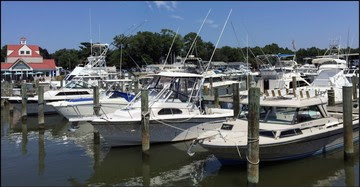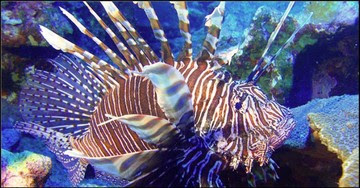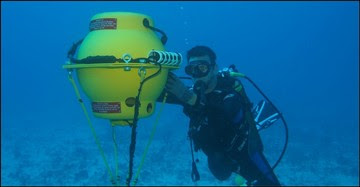HIGHLIGHTS

Commerce Trusted Trader Program Webinars Join NOAA Fisheries next Wednesday, February 28, for a presentation on our proposed rule to establish a voluntary Commerce Trusted Trader Program for U.S. seafood importers—a valuable complement to the U.S. Seafood Import Monitoring Program. We will also host a public meeting at the Seafood Expo in Boston March 12.

"Informed Compliance” for Seafood Import Monitoring Program Ends April 7
NOAA Fisheries announced that, beginning April 7, all filings for seafood products covered by the Seafood Import Monitoring Program must comply with the electronic filing requirements in order for an entry to receive a “may proceed.” NOAA Fisheries’ transitional “informed compliance” approach will end at that time.


Restoring Our Coasts after Industrial Pollution
In 2017, NOAA’s Damage Assessment, Remediation, and Restoration Program worked across the country and in the Caribbean to restore our coasts from hazardous waste, oil pollution, and ship groundings. From Oregon to South Carolina, and New Jersey to Puerto Rico, NOAA works with partners in and outside of government to rebuild valuable ecosystems.

New Committee to Study Coral Reef Resilience
In January, the National Academies of Sciences, Engineering, and Medicine appointed a new committee to study interventions to increase the resilience of coral reefs. Over the next year, the committee will evaluate novel intervention strategies and their potential ecological benefits. Their findings will include a decision-making framework and recommendations on the most promising paths forward.
Alaska

Video: North Pacific Right Whales
With only 30 individuals remaining, North Pacific right whales are among the most critically endangered whales in the world. In this interview, NOAA Fisheries marine mammal scientist Jessica Crance describes joining an International Whaling Commission survey to track down and document these whales.

Video: Cook Inlet Beluga Whales
Watch this new video to learn more about Cook Inlet beluga whales, one of NOAA Fisheries’ Species in the Spotlight. Though subsistence hunting for these whales ended in 1999, the population is still declining. NOAA Fisheries uses a variety of strategies to monitor the population and understand the threats they face.
West Coast

Charting Progress for West Coast Species at Risk
NOAA Fisheries recently submitted our biennial Report to Congress on the status of threatened and endangered species listed under the Endangered Species Act, including five West Coast species at high risk of extinction. Read about NOAA Fisheries’ recent work toward recovering Southern Resident killer whales, Pacific leatherback sea turtles, Central California coho salmon, Sacramento winter-run Chinook salmon, and white abalone.

Webinar Series on Climate Change and Fisheries
The Pacific Fishery Management Council is sponsoring a series of webinars regarding the Fishery Ecosystem Plan Initiative on Climate and Communities. Learn about changes in West Coast species distribution on February 22, and forecasts of fishery participation under different climate scenarios on February 27.
Pacific Islands

Green Sea Turtles of the Northern Mariana Islands
A new study by NOAA Fisheries and regional partners found that endangered green sea turtles in the Northern Mariana Islands are threatened both by poaching of adult females and by rising temperatures that skew sex ratios and increase egg mortality.
Southeast

Impacts of Invasive Lionfish
Populations of invasive lionfish continue to expand, threatening the well-being of coral reefs and other marine ecosystems, as well as the species that depend on them. NOAA Fisheries and our partners are working hard to develop ways to prevent further spread and control existing populations of lionfish.

Funding to Improve Mississippi Water Quality
The Mississippi Trustee Implementation Group recently approved the Upper Pascagoula Water Quality Enhancement Project for funding. The U.S. Department of Agriculture’s Natural Resources Conservation Service is now requesting applications from those interested in participating, with a March 1 deadline for the first ranking period.

Mutton Snapper and Gag Measures – Open for Public Comment
By March 17, please submit your comments on a proposed rule for commercial and recreational mutton snapper and commercial gag management measures in the Gulf of Mexico. Reductions in mutton snapper harvest limits are necessary to ensure that overfishing does not occur, while changes to gag measures will achieve consistency between federal and state regulations.
Greater Atlantic

Caribbean Waters May Hold Clues to Humpbacks
From January through June 2017, researchers from the Northeast Fisheries Science Center and their colleagues in the Caribbean deployed underwater recording devices throughout the Caribbean to record whale sounds. Preliminary analysis of the recordings has revealed new insights into humpback whale behavior.

Woods Hole Science Organizations Involve Students in Real-Time Whale Research
An undergraduate research voyage in the Caribbean presents a perfect opportunity for scientists from the Northeast Fisheries Science Center to continue their research on humpback whales. Genevieve Davis, a marine mammal scientist in the passive acoustics research group, will join the Sea Education Association voyage as a guest scientist. She’ll work with the students to record humpback whale sounds.

Proposed Sea Scallop Rule – Open for Comment
By March 7, please submit your comments on a proposed rule to set specification and management measures for the 2018 Atlantic sea scallop fishery, as well as default measures for the 2019 fishing year. The rule will include opening new areas to scallop fishing and developing accountability measures for three flatfish stocks.

2018 Chesapeake Bay Fisheries Science Grants
NOAA’s Chesapeake Bay Office released details of the FY 2018 Request for Proposals on fisheries science topics related to the Chesapeake Bay. Approximately $500,000 may be available to fund new projects, with a particular interest in funding research on habitat impacts on black sea bass and summer flounder. Applications are due April 26.
| 
No comments:
Post a Comment